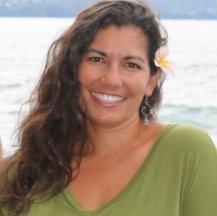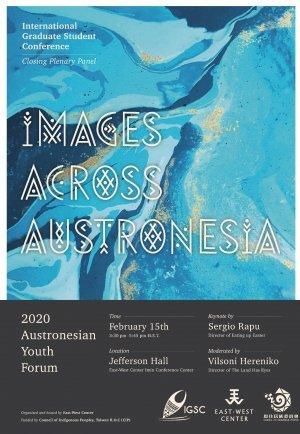Error message
The East-West Center invites students, post-docs, and early-career professionals to take part in the 19th International Graduate Student Conference (IGSC). This student-led Conference provides opportunities for emerging academics to professionally network, gain experience, and present and get feedback on their work. Interactions with peers as well as scholars across disciplines will encourage collaborations and create lasting professional connections.
Opening Ceremony: Thursday, February 13th, 4:30pm-6:00pm

Title: Our Pono Future: Nurturing a place of abundance.
Abstract: Aloha ʻĀina is the rallying call to protect our special places and histories, and a methodology that requires pono science as a process. The concept of aloha ʻāina is used in Hawaiʻi to describe how our people love, care for, and build a relationship with all that feed and nurture us, such as land, ocean, people, and places. The love and respect that is achieved between humans and ʻāina when all is in balance is pono. The search for this just, ethical science process must be cultivated in our research proposals, our methodology, our classrooms, and in how we create our solutions when working in indigenous landscapes. This story will highlight the rigor that is expected and required when trying to use aloha ʻāina and pono science as a methodology to restore abundance. I invite you to join us as we create a pono future where our human and more-than-human relations thrive.
Conference Paper Presentations: Friday (8:30am-5:15 pm) & Saturday (8:30am-3:15 pm)
Weaving Culture Workshop (Elug Patas): Friday (7:30-9:00 pm). Ipiq Maday will share Taiwanese Indigenous Truku weaving culture in this hands-on workshop. Click here to learn more and RSVP.

This student-led Conference provides opportunities for emerging academics to professionally network, gain experience, and present and get feedback on their work. Interactions with peers as well as scholars across disciplines will encourage collaborations and create lasting professional connections.
The theme of this year’s IGSC is Community Voices: Bridging Borders. Recognizing the ethos of the East-West Center’s 60 years of work in the US, Asia, and the Pacific, IGSC-2020 celebrates the voices of communities and their perspectives in the ever-changing local and global spaces. The conference encourages scholarly work on topics of concern to communities across the region, and it is particularly welcoming of the perspectives of indigenous and marginalized communities.
The opening keynote, closing plenary and conference sessions are all free and open to the public.
Receptions and meals are for conference registrants only. To participate fully in all conference activities, please register using the non-presenter registration link below (and pay the conference registration fee of $70.00, which covers the cost of food at reception, coffee breaks, lunches, and the closing Pau Hana event).
The East-West Center invites students, post-docs, and early-career professionals to take part in the 19th International Graduate Student Conference (IGSC). This student-led Conference provides opportunities for emerging academics to professionally network, gain experience, and present and get feedback on their work. Interactions with peers as well as scholars across disciplines will encourage collaborations and create lasting professional connections.
Opening Ceremony: Thursday, February 13th, 4:30pm-6:00pm

Title: Our Pono Future: Nurturing a place of abundance.
Abstract: Aloha ʻĀina is the rallying call to protect our special places and histories, and a methodology that requires pono science as a process. The concept of aloha ʻāina is used in Hawaiʻi to describe how our people love, care for, and build a relationship with all that feed and nurture us, such as land, ocean, people, and places. The love and respect that is achieved between humans and ʻāina when all is in balance is pono. The search for this just, ethical science process must be cultivated in our research proposals, our methodology, our classrooms, and in how we create our solutions when working in indigenous landscapes. This story will highlight the rigor that is expected and required when trying to use aloha ʻāina and pono science as a methodology to restore abundance. I invite you to join us as we create a pono future where our human and more-than-human relations thrive.
Conference Paper Presentations: Friday (8:30am-5:15 pm) & Saturday (8:30am-3:15 pm)
Weaving Culture Workshop (Elug Patas): Friday (7:30-9:00 pm). Ipiq Maday will share Taiwanese Indigenous Truku weaving culture in this hands-on workshop. Click here to learn more and RSVP.

This student-led Conference provides opportunities for emerging academics to professionally network, gain experience, and present and get feedback on their work. Interactions with peers as well as scholars across disciplines will encourage collaborations and create lasting professional connections.
The theme of this year’s IGSC is Community Voices: Bridging Borders. Recognizing the ethos of the East-West Center’s 60 years of work in the US, Asia, and the Pacific, IGSC-2020 celebrates the voices of communities and their perspectives in the ever-changing local and global spaces. The conference encourages scholarly work on topics of concern to communities across the region, and it is particularly welcoming of the perspectives of indigenous and marginalized communities.
The opening keynote, closing plenary and conference sessions are all free and open to the public.
Receptions and meals are for conference registrants only. To participate fully in all conference activities, please register using the non-presenter registration link below (and pay the conference registration fee of $70.00, which covers the cost of food at reception, coffee breaks, lunches, and the closing Pau Hana event).






